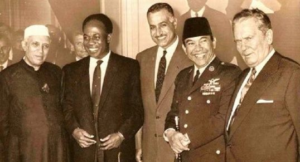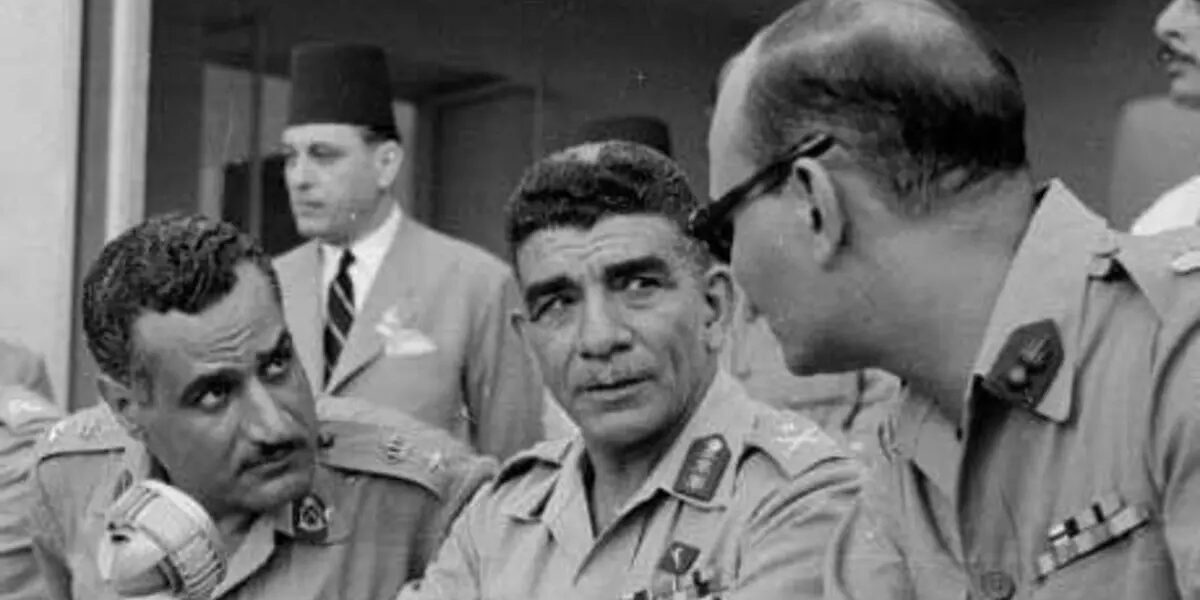This month marks seventy years since a seminal moment in modern Middle Eastern history: the military coup in Cairo of July 1952, which replaced a corrupt monarchy with the military rule that has continued, virtually uninterrupted, since then. With the brief exception of Mohamed Morsi’s elected government in 2012-13, every Egyptian government since has been led by an army general, with the military and security apparatuses exercising authoritarian control of public policy. Since at least the 1980s, this establishment has been fundamentally linked to the vassalage of the United States. Yet, the July 1952 coup was in its day widely hailed as an emancipatory “revolution” against a corrupt, pro-British regime, influencing a decade of similar revolts across the region. This article will examine how such an initially popular revolt turned into a new, repressive status quo.
Military rule, is not itself, what is now called Egypt; the medieval Mamluks were perhaps the most famous of several cycles of military rule. But the modern army, largely comprising native Egyptians as its foot soldiers rather than foreign slave soldiers, was only founded during the reign of Muhammad Ali Pasha, the brilliant and autocratic Albanian adventurer who seized power in the early nineteenth century. This army conscripted local peasants but was largely led by an Albanian or Circassian elite centred around the palace. Ali’s grandson Ismail squandered away Egypt’s riches and left it indebted to Britain, which formally seized control of Cairo as a protectorate and a key link in its global empire, after crushing a native mutiny in 1882. While popular protest led by the nationalist Wafd party forced Britain to yield official control to Ismail’s son Fuad I at the head of a constitutional monarchy in 1922, the next thirty years continued to see Britain exercising effective rule in Egypt, largely through a palace whose luxuries were dependent on British control.
By the end of the Second World War – a conflict that severely impeded Britain’s ability to maintain its global empire – Egypt was in serious and occasionally violent unrest. The elected government had little power vis-à-vis the palace, which in turn had little power vis-à-vis the British occupation. A large number of opposition groups – whether liberal groups such as the Wafd, leftist groups such as the Fatat, or Islamist groups such as the Ikhwan – opposed both monarchic indulgence and the British occupation to which it was bound. The 1948 Palestine war, where an under-equipped Egyptian army performed poorly, and where the initiative was often taken by Ikhwan volunteers, especially catalyzed this unrest. During the war’s last stages, Prime Minister Mahmoud Noukrashy was assassinated and as a result the Ikhwan – who disavowed his murder – were banned and their founder Hassan Banna killed. Nonetheless, the Ikhwan maintained a major organization, dispensing social services as well as maintaining a secret militant wing, which during the early 1950s clashed sporadically with British troops.
This state of affairs provoked serious misgivings in the middle and lower ranks of the army. As early as 1949 a “Free Officers” cell had been founded by Abdel-Monem Abdel-Raouf, an army officer and Ikhwan member – and over the next few years its membership grew. It included Islamists such as Abdel-Raouf, Rashad Mehanna and Kamaleddin Hussein, communists such as Khaled Mohieddin and Youssef Siddik and politically indeterminate dissidents such as Gamal Abdel-Nasser, Abdel-Latif Baghdady and Anwar Sadat. What bound them was experience in the Palestine war and disgust with the status quo.
The Wafd government, trying to negotiate an end to the British occupation, fell in early 1952 after clashes between British troops and local police. The next six months brought several changes of government, among which a major issue was the position of the defence minister to placate the restive army. Farouk insisted on promoting his brother-in-law Ismail Shirine to the position over the more respected Palestine war veteran Mohamed Naguib and appointing Hussein Amer, a notorious general who was aware of and potentially able to crack down on the Free Officers, in his place. Instead, the Free Officers pounced first. A day after Farouk’s latest Prime Minister Naguib Hilaly had been sworn in, they mounted a bloodless coup that was met with enormous public celebrations.
Although it was Nasser who directed the coup, the junior officers pushed forward the respected general Naguib as their figurehead. There was no early indication of particularly revolutionary aims; though Naguib escorted Farouk to exile, his infant son Fuad II was crowned in his stead with a three-man regency – comprising prince Abdel-Munim bin Abbas, the Wafd former speaker Bahaeddin Barakat, and Ikhwani Free Officer Rashad Mehanna. The prime minister was Aly Mahir, a reputedly anti-British politician whose latest stint as prime minister had come just a few months earlier. But real influence rested with the Free Officers’ junta, the so-called “Revolutionary Command Council” led by Nasser.
The junta’s power was only formalized over a two-year period. In September 1952, a trade strike was harshly repressed because of suspicions of communist infiltration; in response one junta member, Siddik, resigned. A land reform, which limited the holdings of the aristocracy, prompted prime minister Mahir to resign, with Naguib taking over his functions. Next the co-regents Barakat and Mehanna were dismissed; this prompted a mutiny by Mehanna’s supporters that was quickly repressed. In summer 1953 Naguib dispensed with the monarchy altogether, returning the infant Fuad II to his father and taking over a presidency.
Through this period the Ikhwan, who had had a significant influence in the Free Officers’ junta, held out expectations of a partnership with the junta, with whom they had shared many aims. This was a controversial strategy and eventually the group’s emir Hassan Hudaiby, who favoured cooperation, dismissed Saleh Ashmawy – the leader of the militant wing. Junta members Kamaleddin and Abdel-Raouf were particularly close to the Ikhwan, and organized paramilitary forces in the Egypti-administered Ghazza Strip for jihad against Israel. Nasser himself and Sadat had some history with the group, and there appeared to be little reason for the group to reject the junta.
However, the junta’s rule depended more on the primacy of the military and security institutions, and this brought them into conflict with both the Ikhwan and with Naguib. Nasser’s close friend Abdel-Hakim Amer took over the army, transforming it over the next fifteen years into his fiefdom. Zakaria Mohieddin, another Free Officer, built up an enormous security apparatus as part of a budding “deep state” – a novelty in the Arab world at that point, but since repeated throughout the region. This apparatus swung into action in early 1954, when mounting tension between Naguib and Nasser over the junta’s overbearing role came to a head. Nasser put Naguib under house arrest, but this provoked mass protests – organized in part by the Ikhwan – and a mutiny in the cavalry corps, which was supported in the junta by a leftist member, Khaled Mohieddin, ironically a cousin of Zakaria. It was the security apparatus led by Zakaria and Salah Nasser that crushed the cavalry mutiny and round up demonstrators. However, public pressure forced Nasser to release Naguib, who tried to reconcile by appointing him prime minister.
Instead, Nasser pounced. He used his old contacts with the Ikhwan to win them over – swearing by Allah that he wanted to fulfill the aims of Hassan Banna – and then pretended to cede power from the junta to the cabinet, a decision that was met with another round of protests. These protests, however, had been masterminded by the security establishment, and proved a useful pretext for a power grab. Over the next few months the prime minister consolidated power around himself, the junta, and the military-security establishment.
The coup de grace came in autumn 1954, with a highly suspicious assassination attempt on Nasser during a speech in Alexandria. The would-be assassin, Ikhwan member Mahmoud Abdel-Latif, missed at point-blank range, while Nasser bellowed to an enthralled audience, “Should they kill Gamal Abdel-Nasser, each of you is Gamal Abdel-Nasser!” The Ikhwan, who again disavowed the assassination, were blamed and banned; Hudaiby and thousands of members were imprisoned, most of his lieutenants – including Youssef Talaat, who had led the clashes with the British occupation – executed, and Abdel-Raouf, the thorniest member of the junta and the Free Officers’ actual founder, disappeared after being blamed for planning the assassination. It wasn’t long before Naguib was framed for involvement, stripped of his office, and put under house arrest. Over the next sixteen years, Nasser would rule Cairo singly as dictator.
In spite of Nasser’s dubious road to power, the Free Officers’ regime had a definite international impact. It was not the first coup in a postcolonial state, but arguably the first with internationalist anticolonial declarations. Over the next twenty years, countless imitations sprouted around the region – army officers seizing power with the slogan of a “Revolution”. Among others, these coups put paid to the monarchies of Iraq, Libya, and North Yemen, while imitators also seriously threatened other pro-Western monarchies such as Jordan, Saudi Arabia, and Morocco. In 1958-61, Syria willingly acceded – to widespread public applause – to merge with Egypt. This was part of a major trend, by no means originating with the Free Officers but to which they played in rhetoric as well as deed, where different political actors – ranging from the Hashimite monarchies to Baathists to Hizbul-Tahrir and Ikhwan and more – emphasized international linkages that went beyond artificial borders. Nasser was effective in channelling this sentiment for his purposes, even as he steered clear of committing to any ideology.
 Particularly with the Non-Aligned Movement and the Suez Crisis, Cairo also cemented itself as a key cornerstone resistance to European colonialism – even as Nasser sought the support of first Washington and later Moscow. Cairo’s “Blessed Revolution” meant different things to different would-be revolutionaries – at least one of Arab, Africa, Muslim, or Third World solidarity. Certainly the regime played up this image, and historical anticolonial leaders such as Morocco’s Abdelkarim Khattabi, Palestine’s Amin Hussaini, and Jordan’s Abdullah Tal moved to Cairo.
Particularly with the Non-Aligned Movement and the Suez Crisis, Cairo also cemented itself as a key cornerstone resistance to European colonialism – even as Nasser sought the support of first Washington and later Moscow. Cairo’s “Blessed Revolution” meant different things to different would-be revolutionaries – at least one of Arab, Africa, Muslim, or Third World solidarity. Certainly the regime played up this image, and historical anticolonial leaders such as Morocco’s Abdelkarim Khattabi, Palestine’s Amin Hussaini, and Jordan’s Abdullah Tal moved to Cairo.
The paradox was that this international revolutionary reputation at home served what was essentially a police state. The security supremos who had helped Nasser take over in 1954 – Zakaria Mohieddin, Salah Nasser, Abbas Redwan, Shamseddin Badran, Samy Sharaf, and others – expanded the security organs into a sinister and repressive shadow state that was even beyond the dictator’s control. It was their influence that partly eroded the union with Syria, which collapsed – after yet another coup – in 1961. Ironically, after Egypt’s defeat in the 1967 war with Israel – a direct outcome of Nasser’s attempt to play Washington and Moscow off each other – the deep state turned on him, attempting to replace him with army commander Amer. Nasser only narrowly survived, but never recovered his prestige. He drew closer to the Soviet Union as a result of America’s support for Israel. This decision was eventually reversed by his successor, Anwar Sadat, who exploited a far better showing in the 1973 war to draw closer to Washington and even make peace with Israel. In order to do this against almost unanimous condemnation Sadat relied largely on the deep state, which would spring into action once more to oust Mohamed Morsi – to date, Cairo’s only popularly elected leader – in 2013. At the end of the day, both military and security apparatuses, whatever their progressive or internationalist pretensions, were hardwired to protect the interests of the state. The military coup popularized by the Free Officers of 1952 proved as susceptible to entrenching the status quo as its predecessors.



Leave a Reply